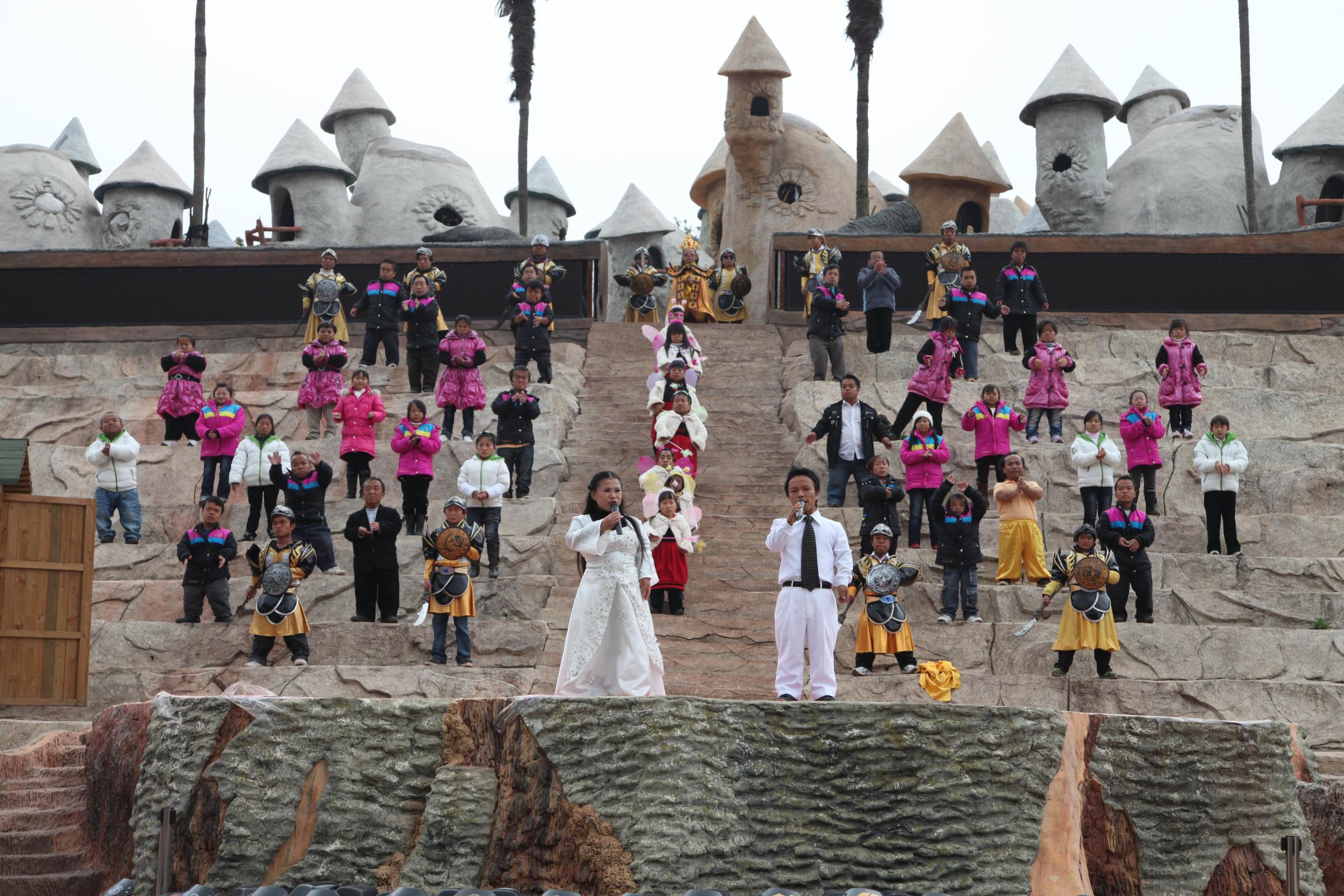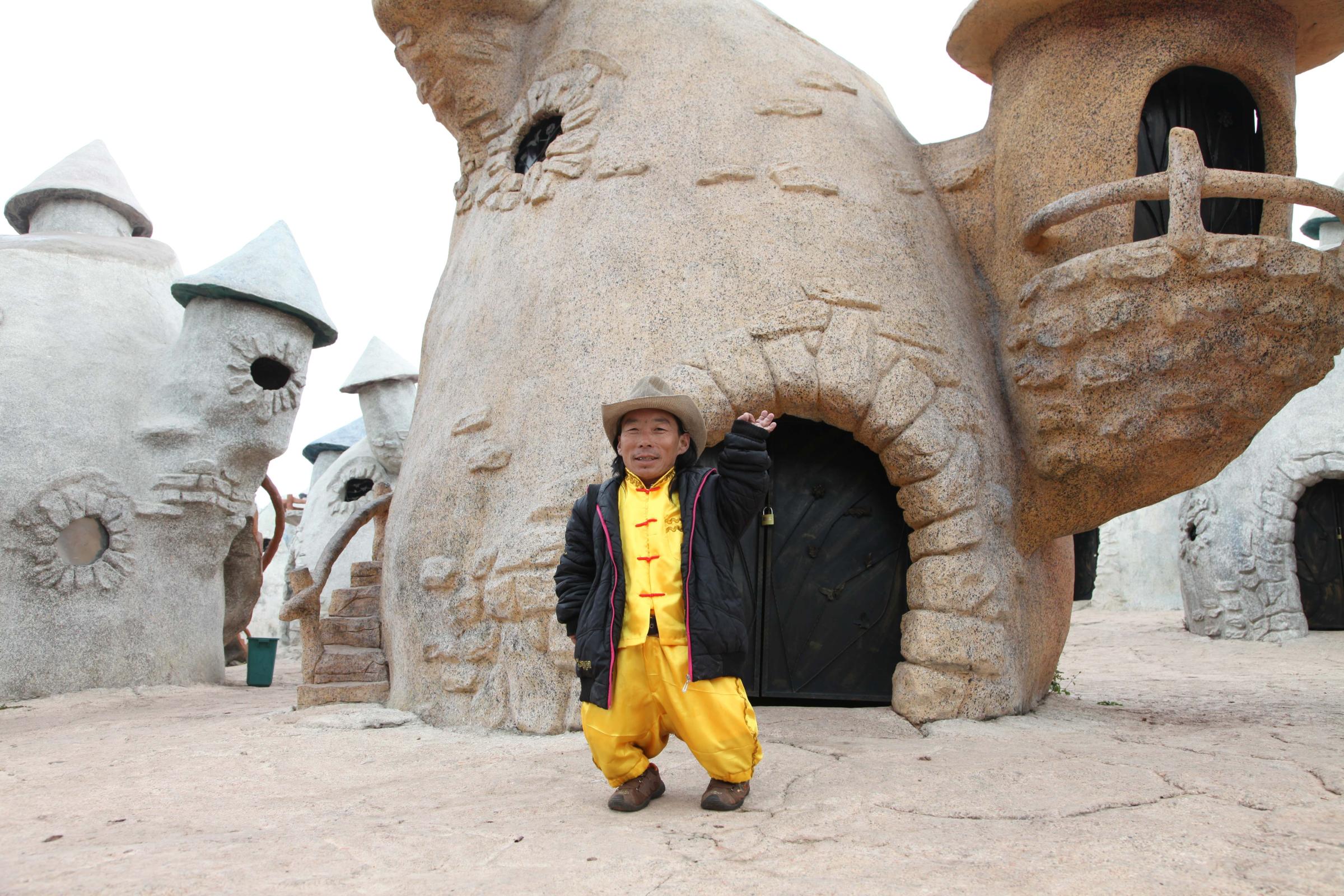A dozen warriors in green tunics and crimson cloaks march down a long central staircase, brandishing golden swords and shields. As the foreboding chorus of Karl Orff’s Carmina Burana fills the open-air amphitheater, a haggard witch appears on an overhanging television screen to issue a blood-chilling curse. Then the frenzied slashing begins.
The audience nibbles sunflower seeds and fiddles with smartphones. An old woman knits. Their mythical enemy defeated, the warriors take their bows and troop off stage, to be replaced by a lone singer less than 3 ft. tall, who charges into a mournful ballad about love lost while clutching a pink plastic rose. “He’s so small!” says a giggling man, who shares my bench in the third row.
Welcome to the Kingdom of the Little People outside Kunming, the capital of southwestern China’s Yunnan province. Since opening in 2009, the theme park has been staffed exclusively by about 100 performers under 130 cm (4ft 3in) tall, most of whom have congenital conditions causing dwarfism.
Dozens of predominantly local tourists pay the 100 yuan ($15) entrance fee every day to watch an mélange of kitsch dance routines ranging from a saucy can-can to a parody of Swan Lake. The acts are hardly polished, and many outsiders see it as the epitome of exploitation. But for those who actually live and perform here, the Kingdom isn’t just a place of work—it’s a sanctuary providing companionship and love for nearly a decade.
“As soon as I arrived and saw people like me I was happy,” says Li Ying’an, 28, who married fellow performer Peng Chunsong, 24, after they met at the Kingdom.
The $14 million theme park is the brainchild of Chen Mingjing, an electronics and real estate mogul, who tells TIME that he came up with the idea after striking up a conversation with two people with dwarfism he met at a train station. “I really pitied their situation,” he says. “Their families despised them, cursed them, so they had to sleep on the street. I thought we should build a kingdom just for them.”
Workers are paid around 2,000 rmb ($320) per month depending on their experience, with lodging and meals provided by the park, which is about equivalent to a full-time wage in a garment factory. “The performers are paid better than the security guard,” says Chen. During the day, the costumed ensemble hangs around an assortment of toadstool houses in the performance area—a nightmarish fusion of Gaudi and Disney—where visitors snap crouching selfies. But most workers actually live in a drab concrete boarding house at the back. There, all facilities are specifically designed for the short of stature, with low kitchen surfaces, small-stepped staircases, and light switches at half the standard height.

“It’s a comfortable life as they only do an hour show in the morning and an hour in the afternoon, so the workload isn’t too much,” says Sha Hongyu, Chen’s assistant who helps manage the park. “And peopleoutside can be so mean.”
Still, the California-based dwarfism support group Little People of America (LPA) has likened the Kingdom to a zoo, and questions whether sequestering people from society is truly the best way to counter stigmatization. China struggles to get people with disabilities into education and employment. (Although the LPA say dwarfism should not be treated as a disability, China has classed it as one since 2007.)
Of the 83 million Chinese people with disabilities, according to official figures, a 2013 Human Rights Watch report estimates over 40% are illiterate, largely due to prejudice amongst the education establishment. Many families resort to horrific measures to care for ailing kin. Chilling reports of caged mentally ill people pop up regularly on local media. Many of the Kingdom’s performers arrive destitute and begging on the street.
According to the Red Cross Society of China, the world’s most populous nation is home to roughly 8 million people of short stature—meaning that the Kingdom only houses an infinitesimal proportion. But there are other exclusive communities scattered around China. “But they don’t generally last very long,” Li says. “The attraction of the Kingdom is that it’s so stable.”
Sure enough, in the village of Changlingzhen, an hour’s drive northwest of Beijing, an derelict blue building once housed another Kingdom where around 200 people of short stature sold handicrafts and put on performances for tourists visiting the nearby Ming Tombs. “It went bust about three years back,” says local resident Mr Hong, who TIME found fishing nearby. “I don’t know where they went after that.”

For people with dwarfism, even education is no panacea. Xu Shengwei found that even after gaining entry to medical school, the insurmountable hurdle was finding work as a doctor after his five years of training was complete. “I was interviewed by a dozen hospitals, but no one offered me a job,” sighs the 30-year-old. “Employers worried that my appearance might damage their hospitals’ image.”
Now Xu helps out with management duties at the Kingdom, though he occasionally still appears on stage. “All my classmates are now working in hospitals,” he adds. “Hearing them talking about their experiences, I feel really sad.”
But although his life in the Kingdom is professionally unrewarding compared with ward rounds, Xu has found something arguably more precious here: a stable, loving relationship. He met his wife, Chen Meixin, in the park in 2016, and they married a year later. Still, he is all too aware that his medical history imposes certain limits on their relationship. “I don’t want to have children, because the chance that my condition might be passed onto my children is very high,” he says. “Even if I could have healthy children, my condition would have a negative influence on them.”
Li shared the same fears when he found out Peng was pregnant. Children of people with dwarfism face a cruel genetic lottery dependent on a variety of factors: some are born symptom-free, others with conditions like their parents, and a significant proportion can be stillborn. Fortunately for Li and Peng, their daughter, Lele, was healthy. Now aged two, she is being cared for by her grandparents over 1,000 miles away in Shaanxi province, as is common practice in China among parents forced to migrate from their home villages to find work.
“When I was pregnant with my daughter, I was under a lot of stress,” says Peng. “Luckily she kept kicking in my belly. I just imagined what she would be like, imagined how I should I dress her up and take her to school. I just wanted her to be happy.”
But living so far away from their daughter augments the sense of estrangement between them. “I feel she is drifting apart from us,” says Peng. “Sometimes when I call her, she ignores me.”
With Lele growing up far from the Kingdom, surrounded by a society that has already cast her parents out, Li and Peng worry whether filial devotion or community prejudice will fill their daughter’s heart. “I hope my mom can educate her well, so when she grows up, she won’t discriminate against her defective parents,” says Li. “We really worry about it.”
More Must-Reads from TIME
- Caitlin Clark Is TIME's 2024 Athlete of the Year
- Where Trump 2.0 Will Differ From 1.0
- Is Intermittent Fasting Good or Bad for You?
- The 100 Must-Read Books of 2024
- Column: If Optimism Feels Ridiculous Now, Try Hope
- The Future of Climate Action Is Trade Policy
- FX’s Say Nothing Is the Must-Watch Political Thriller of 2024
- Merle Bombardieri Is Helping People Make the Baby Decision
Write to Charlie Campbell / Kunming at charlie.campbell@time.com